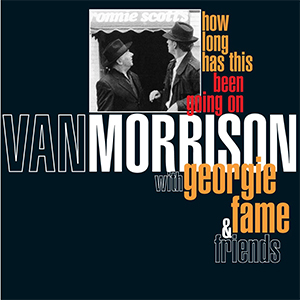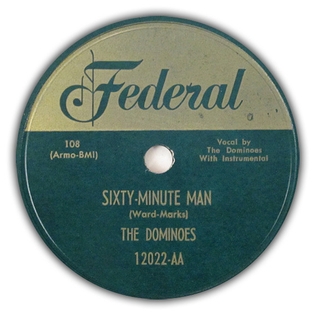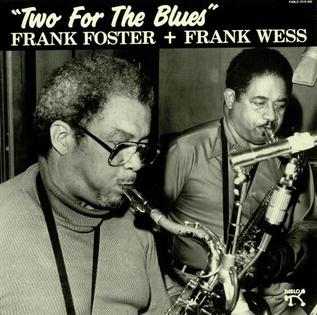Related Research Articles

A double entendre is a figure of speech or a particular way of wording that is devised to have a double meaning, of which one is typically obvious, whereas the other often conveys a message that would be too socially awkward, sexually suggestive, or offensive to state directly.

Ruth Wallis was a novelty popular cabaret singer.

How Long Has This Been Going On is the twenty-fourth studio album by Northern Irish singer-songwriter Van Morrison, "with Georgie Fame and Friends", released in December 1995 in the UK. It charted at No. 1 on Top Jazz Albums.

Ella Fitzgerald Sings the Duke Ellington Song Book is a 1957 studio album by the American jazz singer Ella Fitzgerald, accompanied by Duke Ellington and his orchestra, focusing on Ellington's songs.

Live at Carnegie Hall is the ninth album by American blues rock band Stevie Ray Vaughan and Double Trouble, released by Epic Records in July 1997. The album consists of live selections from their sold-out October 4, 1984 benefit concert at Carnegie Hall for the T.J. Martell Foundation. Backed by a ten-piece big band for the second half of the event, Vaughan had celebrated his thirtieth birthday the night before, and called the concert his "best birthday ever, forever". The band's double-set performance, which included several blues and R&B standards, was highly successful, receiving mostly positive reviews from music critics.

Live at the Apollo is a blues album by B.B. King and the Phillip Morris "Super Band" recorded at the famous Apollo Theater in Harlem, New York. It was awarded the 1992 Grammy Award for Best Traditional Blues Album.

"Sixty Minute Man" is a rhythm and blues (R&B) record released on Federal Records in 1951 by the Dominoes. It was written by Billy Ward and Rose Marks and was one of the first R&B hit records to cross over to become a hit on the pop chart. It is regarded as one of the most important of the recordings that helped generate and shape rock and roll.

"It's So Hard" is a song written and performed by John Lennon, which first appeared on his 1971 album Imagine. Shortly after the album's release, the song was issued as the B-side to the single "Imagine". In Mexico, it was released on an EP with "Imagine", "Oh My Love" and "Gimme Some Truth". In 1986, a live performance from 30 August 1972 was issued on Lennon's live album Live in New York City.
Dirty blues encompasses forms of blues music that deal with socially taboo and obscene subjects, often referring to sexual acts and drug use. Due to the sometimes graphic subject matter, such music was often banned from radio and only available on a jukebox. The style was most popular in the years before World War II, although it had a revival in the early 1950s.

Coleman Hawkins Encounters Ben Webster is a studio album recorded on October 16, 1957, by Coleman Hawkins and Ben Webster, accompanied by a rhythm section led by Oscar Peterson.
"Big Ten Inch Record", also known as "Big Ten-Inch ", is a rhythm and blues song written by Fred Weismantel. It was first recorded in 1952 by Bull Moose Jackson and released by King Records. The song was later covered by Aerosmith and released as part of the 1975 album, Toys in the Attic. It has been rated as one of the best double entendre songs of all time.

Krupa and Rich is a 1956 studio album by jazz drummers Gene Krupa and Buddy Rich, released on Norman Granz' Clef Records. Krupa and Rich play on two different tracks each and play together only on "Bernie's Tune." Krupa and Rich would record again for Verve Records; their album Burnin' Beat was released in 1962.

Diz and Getz is an album by Dizzy Gillespie, featuring Stan Getz.

Joe Cool's Blues is an album by jazz trumpeter Wynton Marsalis and his father Ellis Marsalis that was released in 1995. The album reached a peak position of No. 3 on Billboard's Top Jazz Albums chart.

King of the Tenors is an album by American jazz saxophonist Ben Webster featuring tracks recorded in 1953 for the Norgran label and originally released as The Consummate Artistry of Ben Webster. The album was re-issued in 1957 on Verve Records as King of the Tenors, and has been released with that title ever since. Webster is accompanied by The Oscar Peterson Trio, and, on several tracks, by Benny Carter and Harry "Sweets" Edison.

Two for the Blues is an album by saxophonists Frank Foster and Frank Wess which was recorded in 1983 and released on the Pablo label the following year.
"Big Long Slidin' Thing" is a 1954 rhythm and blues song written by Eddie Kirkland and Mamie Thomas, sung by Dinah Washington, and arranged by Quincy Jones. It has been covered by a number of different artists, and has been rated as one of the best double entendre songs of all time.
"It Ain't the Meat ", also known as "It Ain't the Meat", is a rhythm and blues song written by Henry Glover and Syd Nathan. It was first recorded in 1951 by the Swallows and released by King Records. It was later covered by Maria Muldaur in a 1974 version that has been credited with popularizing the song's title phrase as a proverb, referring to the importance of a man's sexual technique over the size of his penis.
"Keep On Churnin' " is a rhythm and blues song written by Henry Glover, Jester Hairston, and Lois Mann. It was first recorded in 1952 by Wynonie Harris, with backing from the Todd Rhodes Orchestra, and released by King Records. The song was also recorded by Hank Ballard and the Midnighters. It has been rated as one of the best double entendre songs of all time.
Dorothy Ellis was an American blues singer and songwriter, who was inducted into the Oklahoma Jazz Hall of Fame in 2011, having been an inductee of the Oklahoma Blues Hall of Fame in 2004. She was known as Miss Blues and was often billed under that moniker. Ellis performed across eight decades, releasing two singles in her teenage years, including the dirty blues number, "Drill Daddy Drill", and a number of albums later in life.
References
- 1 2 "78 Record: Dorothy Ellis - Drill Daddy Drill (1952)". 45worlds.com. Retrieved September 4, 2022.
- ↑ "45 discography for Federal Records". Globaldogproductions.info. Retrieved September 4, 2022.
- ↑ "Rick Darnell (3)". Discogs.com. Retrieved September 4, 2022.
- ↑ "Mario Delagarde". Discogs.com. Retrieved September 4, 2022.
- ↑ "KDP | Session | Dorothy Ellis, Los Angeles, CA, January 16, 1952". 1540brewster.com. Retrieved September 4, 2022.
- ↑ Frank Buchmann-Moller (5 February 2010). Someone to Watch Over Me: The Life and Music of Ben Webster. University of Michigan Press. p. 143. ISBN 9780472025985.
- ↑ "Billboard". Nielsen Business Media, Inc. 3 May 1952. Retrieved September 4, 2022– via Google Books.
- ↑ "The Cash Box Jazz 'n Blues Reviews" (PDF). Worldradiohistory.com. May 17, 1952. p. 22. Retrieved September 4, 2022.
- ↑ Eagle, Bob L.; LeBlanc, Eric S. (1 May 2013). Blues: A Regional Experience. ABC-CLIO. p. 295. ISBN 9780313344244 . Retrieved September 4, 2022– via Google Books.
- ↑ "Obituary for Dorothy "Miss Blues" Ellis at Howard-Harris Funeral Services". Howardharrisfs.com. Retrieved September 4, 2022.
- ↑ "Dictionary definition of "drill"h". Google.co.uk. Retrieved September 4, 2022.
- ↑ Terry Victor; Tom Dalzell, eds. (26 June 2015). The New Partridge Dictionary of Slang and Unconventional English. Taylor & Francis. p. 743. ISBN 9781317372523.
- ↑ "Gripsweat - RARE 1952 RISQUE BLUES-DOROTHY ELLIS-DRILL DADDY DRILL/MUST GO OUT AND PLAY-HEAR". Gripsweat.com. Retrieved September 4, 2022.
- ↑ "Various Artists - He Got Out His Big Ten Inch: Risque R&B and Rude Blues Album Reviews, Songs & More". AllMusic . Retrieved September 4, 2022.
- ↑ "He Got Out His Big Ten Inch: Risque R&B and Rude Blues - Various Artists | Releases". AllMusic . Retrieved September 4, 2022.
- ↑ "Eat to the Beat: The Dirtiest of the Dirty Blues - Various Artists | Releases". AllMusic . Retrieved September 4, 2022.
- ↑ "Dorothy Ellis | Credits". AllMusic . Retrieved September 4, 2022.